Choosing the right care for a senior family member is a big step. It’s important to understand the different services available and what fits their needs.
Some seniors may still be active, while others may require daily help. Knowing the right path helps families make better decisions. Whether it’s home care, assisted living, or specialized support, exploring every option matters.
Learn more about the best elderly care options to find the right support for your loved one.
In-Home Care for Independence
In-home care works well for seniors who want to stay in familiar surroundings. A caregiver can help with meals, medication, and personal needs. It offers comfort and control over their daily schedule.
Many families choose this for parents who still enjoy some level of independence. It’s less disruptive and more personal. This option also lets seniors maintain a connection with their community.
Assisted Living for Daily Support
Assisted living is ideal for seniors who need help with daily tasks but not full medical care. It provides a safe place with staff ready to help when needed. Meals, housekeeping, and social activities are usually included.
This setup helps ease stress for both seniors and their families. It’s also a good step before considering full-time nursing care. Living options for active seniors often start with assisted living when they need some extra help.
Memory Care for Dementia and Alzheimer’s
Memory care is designed for seniors with memory loss or cognitive decline. These centers focus on safety, routine, and mental engagement. Staff are trained to handle behaviors linked to dementia.
Spaces are built to prevent wandering and confusion. Families can feel more at ease knowing their loved one is in a secure setting. Memory care supports emotional and physical well-being every day.
Skilled Nursing for Complex Medical Needs
Skilled nursing is best for seniors with serious health conditions. It offers 24/7 medical care and supervision by licensed professionals. Physical therapy and rehab are usually available on-site.
This is often the right choice after a hospital stay. It’s more focused on medical treatment than daily living help. It’s also a long-term solution for chronic illnesses that need constant monitoring.
Short-Term Respite Care
Respite care gives family caregivers a break while ensuring the senior is still cared for. It can last from a few days to a few weeks. This service includes meals, personal care, and activities.
It’s also a good trial run for longer-term care. Seniors get a change of pace, and families get time to rest. Respite care helps avoid burnout and supports healthy family dynamics.
Continuing Care Retirement Communities
These communities offer different care levels in one place. Seniors can move between services as their needs change. They might start in independent living and shift to assisted or nursing care later.
This makes planning easier and keeps seniors in one familiar environment. It also builds a strong sense of community. Many families prefer this all-in-one option for long-term stability.
Explore the Best Elderly Care Options for Your Loved One
Finding the right elderly care option takes time, but it’s worth the effort. Start by thinking about your loved one’s needs now and what they might need later.
Explore all care levels and understand what each offers. Make sure to ask questions and tour the facilities if possible.
The goal is comfort, safety, and quality of life. When you know the options, you can choose with confidence.
For more helpful topics, you can check our blog.
















